calsfoundation@cals.org
Black Oak Arkansas
Black Oak Arkansas, a popular rock and roll band of the 1970s from rural Arkansas near Black Oak (Craighead County), was the first Arkansas rock band to have significant commercial success.
Originally called the Knowbody Else, the band was formed in 1965 by singer James “Jim Dandy” Mangrum from Black Oak and guitarist Rickie Lee Reynolds from Manila (Mississippi County). The band was signed to Stax Records and released an album, The Knowbody Else, on Enterprise, a Stax subsidiary, as well as Early Times, which was released on Stax. Despite the failure of these albums, the band continued touring the nation and was “discovered” in California by Ahmet Ertegun of Atlantic Records, who signed the band in 1970. They changed their name to Black Oak Arkansas and released the eponymous album Black Oak Arkansas in 1971 on Atco, a subsidiary of Atlantic.
The Atco debut, which mixed hard rock, down-home Dixie boogie, and quasi-mystical country music, featured Mangrum on vocals and washboard, Reynolds on guitar, Harvey “Burley” Jett of Marion (Crittenden County) and Stanley “Goober” Knight from Little Rock (Pulaski County) on guitars, Pat “Dirty” Daugherty from Jonesboro (Craighead County) on bass guitar, and Wayne “Squeezebox” Evans on drums. Besides the three-guitar harmony, the band’s sound was characterized by Jim Dandy’s gravelly voice. The album benefited from the airplay of “underground” radio programs such as the late-night program Beaker Street on KAAY (AM 1090 out of Little Rock), which introduced the band to a national audience by making such songs as “Lord Have Mercy on My Soul,” “When Electricity Came to Arkansas,” “Hot and Nasty,” and “Uncle Lijah” staples of its program.
Following the success of Black Oak Arkansas, the band toured extensively from 1972 to 1977 and became known for its high-energy shows and Mangrum’s overt sexuality. In those years, the band was one of the highest grossing live acts in the United States. The blond, long-haired Mangrum performed bare-chested and wore tight, white spandex pants, influencing such performers as David Lee Roth, Jesse James DuPree, and Axl Rose in later years. Band members and their families lived in Oakland (Marion County) during much of the 1970s and even helped to fund the construction of the local school.
After the Atco debut album, Tommy Aldridge replaced Wayne Evans on drums, as the band became a more professional touring unit. In 1972, the band released two well-received albums, Keep the Faith and If An Angel Came to See You, Would You Make Her Feel At Home? In 1973, the album Raunch ‘N’ Roll Live documented the fire of their live performances. Jimmy Henderson replaced Harvey Jett on guitar in June 1974.
The follow-up album, 1973’s High on the Hog, featured the band’s only Top 40 hit, a fiery version of LaVern Baker’s rhythm and blues classic “Jim Dandy,” which featured a duet between Mangrum and female singer Ruby Starr, who began touring regularly with the band. High on the Hog peaked at No. 52 on the Billboard album charts.
In 1974, the band released the album Street Party. Their 1975 album Ain’t Life Grand, which featured a version of the Beatles’ “Taxman,” was the last for the classic lineup of the band.
Black Oak Arkansas then signed with MCA and released X-Rated (1975), Balls of Fire (1976), and 10-Year Overnight Success (1976). By 1977, Mangrum was the only original member remaining in the band, which had not only left a legacy of high-energy Arkansas rock but had also raised hundreds of thousands of dollars for state benefits, including Arkansas Children’s Hospital.
The band released two albums on Capricorn, Race with the Devil (1977) and I’d Rather Be Sailing (1978). After Mangrum recovered from a heart attack in 1984, he reunited with Reynolds to release Ready as Hell on HM USA. Mangrum then released The Black Attack is Back in 1986. The band’s later work, however, was relatively lackluster compared with the early Atco records.
A well-received greatest-hits package, Hot and Nasty, was released on Rhino in 1992, and a “King Biscuit Flower Hour” live set was released in 1998.
Despite a heart attack in the 1980s and a bad car accident in 1991, Mangrum continued to put together various incarnations of the band throughout the 1990s. He reunited again with Reynolds and Daugherty to release The Wild Bunch on the Cleopatra label in 1999.
In 2002, Rhino released a retrospective DVD, Black Oak Arkansas: The First 30 Years. In 2013, Black Oak Arkansas signed with Atlantic/ATCO Records; the band released a new album, Back Thar N’ Over Yonder, in October 2013. In 2019, the band released Underdog Heroes. Founding member Reynolds died in 2021. In 2023, the band released The Devil’s Jukebox.
For additional information:
Black Oak Arkansas: The First 30 Years. Rhino DVD, 2002.
Bowden, Bill. “Rickie Lee Reynolds, Lead Guitarist for Band from Black Oak Arkansas, Dead at 72.” Arkansas Democrat-Gazette, September 7, 2021, p. 2B. Online at https://www.arkansasonline.com/news/2021/sep/07/reynolds-lead-guitarist-for-black-oak-arkansas/ (accessed July 11, 2023).
George-Warren, Holly, and Patricia Romanowski, eds. The Rolling Stone Encyclopedia of Rock & Roll. New York: Rolling Stone Press, 2001.
Hutson, Cecil. Analysis of the Southern Rock and Roll Band Black Oak Arkansas. New York: Edwin Mellen Press, 1996.
Hutson, Kirk. “Hot ’N’ Nasty: Black Oak Arkansas and Its Effect on Rural Southern Culture.” Arkansas Historical Quarterly 54 (Summer 1995): 185–211.
Bryan Rogers
North Little Rock, Arkansas
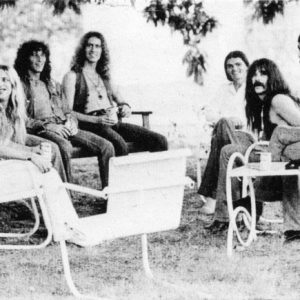 Black Oak Arkansas
Black Oak Arkansas 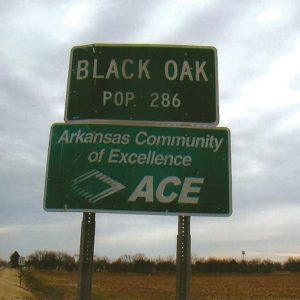 Black Oak Sign
Black Oak Sign  "Jim Dandy," Performed by Black Oak Arkansas, Featuring Ruby Starr.
"Jim Dandy," Performed by Black Oak Arkansas, Featuring Ruby Starr. 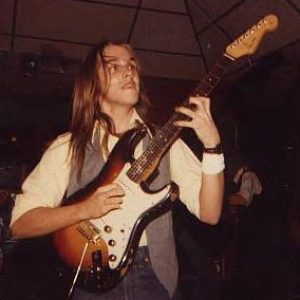 Shawn Lane
Shawn Lane 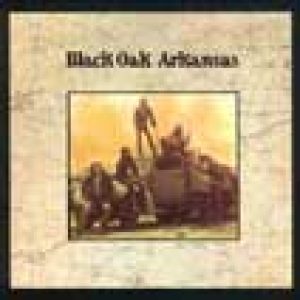 "Lord Have Mercy on My Soul," Performed by Black Oak Arkansas
"Lord Have Mercy on My Soul," Performed by Black Oak Arkansas  Jim Dandy Mangrum
Jim Dandy Mangrum 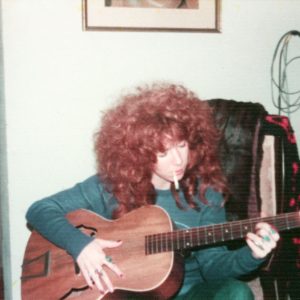 Ruby Starr
Ruby Starr 




Comments
No comments on this entry yet.